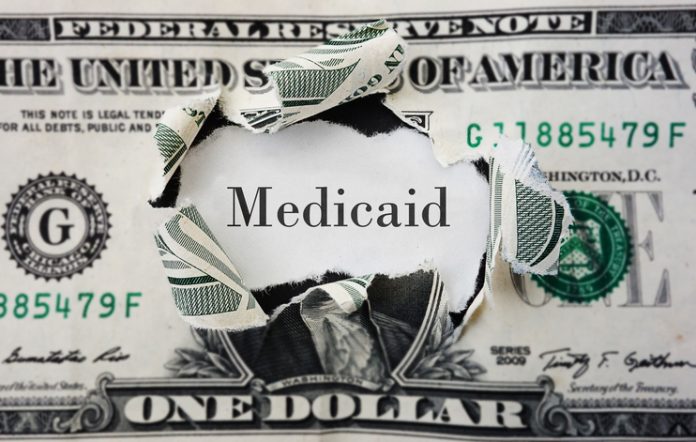Progressive policies expand Medicaid, increasing the number of people dependent on government for health care.
By Eileen Griffin
Medicaid spending has increased significantly as progressive policies made access easier and eliminated accountability.
Medicaid expenditures increased 9.6 percent between 2021 and 2022, the Washington Examiner reports. In 2022, the program cost taxpayers $805 billion.
The Affordable Care Act (Obamacare) increased the number of people receiving taxpayer funded healthcare by 50 percent in the states that agreed to the expanded definition of eligibility. States found that they spend almost a third more than they had planned on the expanded benefits.
Under former President Barack Obama, the level to qualify for Medicaid was increased to $20,000 of annual income per individual. There were no other limitations placed on the participants such as a work requirement.
The overspending on this program grew again during the COVID-19 pandemic when states enrolled were provided with additional funds from the federal government to keep ineligible people covered.
During this time nearly 23 million participants deemed no longer eligible were retained on the Medicaid rolls.
By the end of 2022, 90 million people were still on Medicaid despite the low unemployment rate and large number of employers seeking to fill positions.
States straining with the expenses started de-enrolling able-bodied adults to have enough money to pay for disabled individuals or children living in poverty. The Biden administration has asked states to “go easy” on the de-enrollment process.
Many adults perfectly capable of working and earning their own employer-sponsored medical insurance are choosing to let taxpayers carry them instead.
“In states that have expanded the program, spending on able-bodied and working-age adults is growing at a faster rate than spending on low-income children,” writes Sally Pipes, president, CEO, and Thomas W. Smith fellow in healthcare policy at the Pacific Research Institute. “Taxpayers shouldn’t be subsidizing care for people who don’t need the help.”
Republicans have tried to reign in the Medicaid spending but have been met with resistance from Democrats, Politico reported earlier in the year.
“Medicaid was always intended for the aged, blind and disabled — for the least in our society, who need help the most,” Rep. Buddy Carter (R-GA) told Politico at the time. “Trying to get back to that would probably be beneficial.”
Some Republicans would like to add a work requirement for those receiving the taxpayer funded health insurance.
“For the people who are on traditional Medicaid—the pregnant, children and disabled—there’s no sense in talking about work requirements,” Rep. Michael Burgess (R-GA) said. “But for the expansion population, able-bodied adults who were wrapped in under the Affordable Care Act, yeah, that has to be part of the discussion.”
Efforts to help people often end up hurting them as progressive policies tend to build dependency and normalize the acceptance of taxpayer funded handouts.
Gary M. Galles, Professor of Economics at Pepperdine, reviewed a 1985 study by James Gwartney and Thomas McCaleb entitled, Have Antipoverty Programs Increased Poverty?”
The authors studied results of the “war on poverty” concluded that government support advocated by progressive policies resulted in more people living in poverty.
“Gwartney and McCaleb discussed four ways incentives were worsened by those programs,” Galles writes. “Through increased real benefits, increased implicit tax rates, decreased incentives to acquire and retain skills, and decreased incentives to avoid adverse lifestyle choices. Of particular importance today is their analysis of why the effects of such programs will be more adverse, both the longer they last and the younger are those impacted.”
Many of those captured by the Medicaid expansion and the subsequent COVID-19 funds are young and able-bodied single adults. This is particularly concerning because younger people should be gaining skills and experience, not building dependency.
“The moral hazard effect arises because substantial increases in government assistance can enable some to choose ‘a lifestyle that increases the likelihood of poverty’ and that incentive is more damaging to one’s productive life the earlier it begins,” Galles writes.
For many, it is just easier to avoid work and remain on government assistance.
“In sum, it seems like our failure to recognize what Gwartney and McCaleb did almost four decades ago—just how seriously the adverse effects of our efforts to ‘help’ people hurt them instead—has come back to haunt America with a vengeance,” Galles writes. “We have recently doubled down on more of the same types of policies, which means we will see even more of their adverse effects.”
“So long as the government continues egregious progressive policies, the hardworking Americans fueling the economy will be unable to do so, [being productive] making for a government-dependent and economically unfree status that capitalism, with limited government, once helped them escape,” writes Vance Ginn, chief economist at the Pelican Institute for Public Policy and senior fellow at Young Americans for Liberty.
For more Health Care News.





















